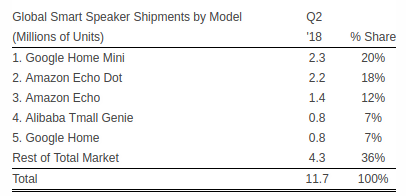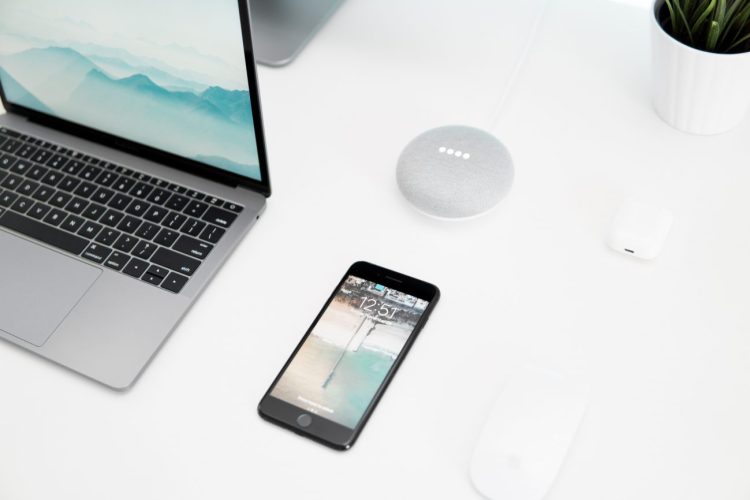Watch all the Transform 2020 sessions on-demand here.
Move over, Amazon: Google has captured the smart speaker crown. According to a report today from Strategy Analytics, Google Home Mini was the best-selling voice-enabled speaker in the second quarter of 2018, followed by Amazon’s Echo Dot. They collectively accounted for 38 percent of the 11.7 million speakers shipped globally.
Broadly speaking, Google and Amazon swept the floor with the competition. With Amazon’s Echo added to the mix, the two nabbed 50 percent — or 5.8 million units — of all Q2 smart speaker sales.
By comparison, Apple’s HomePod failed to rank in the top five by shipments — it made up 6 percent, lower than Alibaba’s Tmall Genie and Google Home. However, analysts noted that it’s the market leader in the $200+ premium price segment with a 70 percent share.

Above: Smart speaker sales by model in Q2 2018.
“The number of smart speaker models available worldwide has grown significantly over the last twelve months as vendors look to capitalize on the explosive market growth,” David Mercer, vice president at Strategy Analytics, said in a statement. “Heavyweight brands such as Samsung and Bose are in the process of launching their first models, adding further credibility to the segment and giving consumers more options at the premium-end of the market.”
June 5th: The AI Audit in NYC
Join us next week in NYC to engage with top executive leaders, delving into strategies for auditing AI models to ensure fairness, optimal performance, and ethical compliance across diverse organizations. Secure your attendance for this exclusive invite-only event.
In May, Strategy Analytics pegged overall smart speaker shipments at 9.2 million units, pointing out that Amazon’s share had dipped below 50 percent.
It’s not the only firm claiming that Google has leapfrogged the retailer.
Last month, Canalys said that Google Home and Google Home Mini devices were the top-selling speakers in Q2 with 5.4 million models shipped, and in a prior report predicted that Amazon would see its market share slip to 34 percent by 2022.
The number of voice-enabled speakers in use could come close to 100 million by the end of this year (up from 50 million at the end of 2017), some suggest, and early momentum more or less aligns with that prediction.
NPR and Edison Research estimated in July 2018 that 18 percent of American adults — around 43 million people — owned a smart speaker. (Consumer Intelligence Research Partners and Voicebot put the number at 50 million and 47.3 million, respectively.) And Strategy Analytics said the market saw 278 percent year-on-year growth in Q1.
Sales overseas, too, grew greatly. Smart speaker shipments in China rose 52 percent in Q2 compared to the U.S.’s 16 percent growth, reported Canalys, driven mostly by Alibaba and Xiaomi. (Xiaomi’s Mini AI speaker alone contributed to a 228 percent uplift.)
The global smart speaker market could be worth as much as $30 billion by 2024, according to Global Market Insights.


